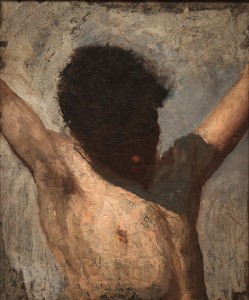 History Channel’s The Bible series is worse than reality TV
History Channel’s The Bible series is worse than reality TV
By Alan Yuhas, Monday 25 March 2013 09.15 EDT
The History Channel more or less abandoned the pretext of history years ago. As programs like “UFO Hunters”, “Swamp People” and “Hairy Bikers” added up, the network’s decision to broadcast The Bible as a mini-series seemed like an obvious disaster. It is, too, in all ways except one: ratings. The scriptures according to basic cable don’t purport to be historical, but they’re about as bad and cynical as TV can be. I don’t necessarily question the sincerity of the head producers, Mark Burnett, the creator of the reality show Survivor, and his wife, Roma Downey; they’ve said this is their “calling” and want to alleviate “Bible illiteracy”. I do question their methods, however, not to mention the results. Why are so many people watching? Narrative? The producers don’t seem very concerned with narrative. The book has more rich stories and characters than could ever fit into a mini-series, a fact the producers acknowledge by leaving most of it out. They jump from one famous story to another; Eden, Noah, and Moses get crammed into one episode, for example. The Ten Commandments only get a brief mention by the narrator. Characters are one-dimensionally good or evil, and the dialogue is so wooden Jesus could’ve carved a table out of it. The sum is bland, erratic, and would be incoherent if it weren’t somewhat familiar material. The Wire this is not. Nor is it Mad Men: people sure aren’t watching for the production values. The actors deliver lines with the bombast of a comic book or the whispery solemnity of a high school staging Hamlet. The CGI and slow-mo action sequences, which are legion, evoke nostalgia for Cecil B DeMille’s Red Sea. Downey has bragged about the show’s low budget, but the result is so cringe-inducing that one wishes History had tossed them a few more shekels.
Bible scholars have made deeper criticisms, including the “whitewashed” cast, the marginalized role of women, and an aversion to unpleasant details so strong that the show ultimately misrepresents the Bible.
The cast, touted as “international”, consists of mostly white Europeans and Americans; so far, only Samson and Satan have been major characters played by minorities, sparking anger and amusement, for the respective castings.
Patriarchy of the text aside, the Bible doesn’t work without its many strong women, but the series keeps them on the margins, even when Downey herself dons Mary’s veil several hours in. These decisions are aimed at making the show more immediately familiar to the conservative, American Christians, who apparently can’t handle actors who don’t look like them. Glenn Beck, for instance – a man who might be called resistant to change – has praised it as “a vision, a gift that I haven’t seen ever before on television”. Moreover, the show airbrushes or omits anything even remotely uncomfortable: slaves are referred to as “servants”, all marriages are made to look monogamous, and violence is mostly portrayed as either God’s will or the actions of villains. Per the scholar Wil Gafney:
“The Bible is a wonderfully rich, complicated, challenging, illuminating, revelatory text. It is also horrifically violent and does not say what we want the way we want it to.”
Great but ambiguous stories – the one where God and the devil ruin a man’s life on a bet, for instance – have no place in this series. One suspects they skip the Ten Commandments because of that bit when Moses crashes the party round a golden calf. Don’t expect to see any of the really dark or strange stuff, either, like what happens to Lot after his wife turns to salt. But as Professor Paul Harvey points out, the show has courted its audience effusively.
The producers pre-screened the show to religious leaders, picking up endorsements from mega-church pastors Rick Warren and Joel Osteen and a “partnership” with the World Evangelical Alliance. Christian dating sites jumped on board, and even Walmart has aggressively promoted the show. All this for a readymade audience.
Mel Gibson’s Passion of the Christ broke box office records, despite Inquisition levels of violence and anti-Semitic overtones. Dan Brown made a fortune with a poorly written tale about Jesus with kids and a psychotic monk. Because biblical basics are ingrained in our culture, and because they’re so powerful in the right hands – like those of Mikhail Bulgakov, Toni Morrison or even Monty Python – works with religious underpinnings will always draw a crowd.
Nobody expected art – or even history – from the History Channel, but the producers veered so far in the opposite direction that they erased all the personality and depth of the source, not to mention heart or wit. The History Channel has given us the Bible as reality TV. The result amounts to little more than an exploitation of faith. Everyone – believers, nonbelievers, anyone who appreciates a good story or TV series – deserves better.
http://www.guardian.co.uk/commentisfree/2013/mar/25/history-channel-the-bible-series-is-reality-tv or http://bit.ly/YPnHHd
Oil painting, study for The Crucifixion, by Thomas Eakins, 1880. http://en.wikipedia.org/wiki/File:Sketch_for_the_Crucifixion.jpg
